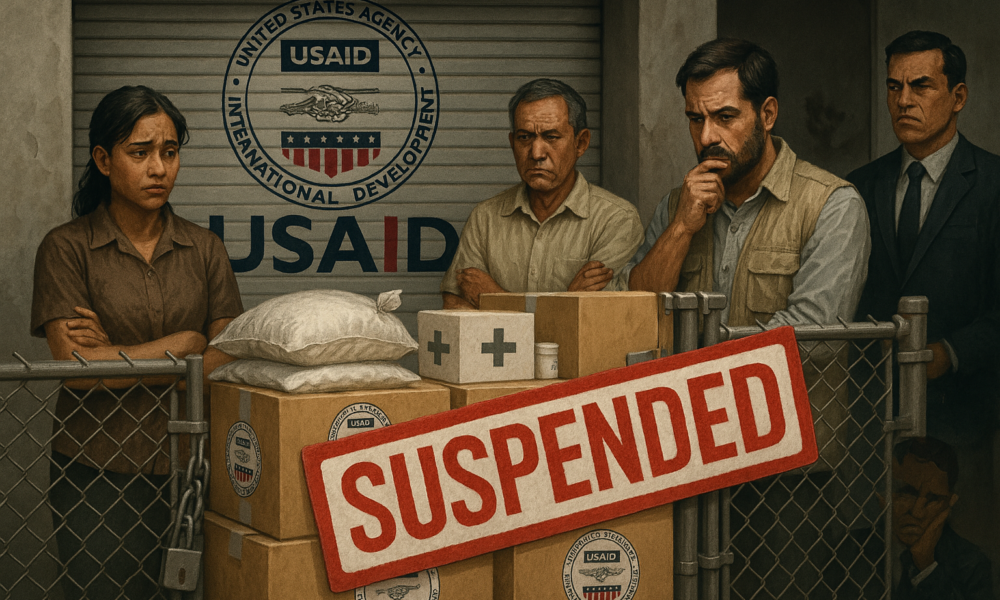
By Wabusimba Amiri.
In the shadows of the recent U.S. foreign policy realignment under President Donald Trump’s directive on Diversity, Equity, Inclusion, and Accessibility (DEIA), Uganda stands at a volatile crossroads economically bruised, socially destabilized, and politically silent. The world is watching, but inside Uganda, there’s a deafening quiet. Parliament is yet to debate the abrupt aid suspension that has paralyzed key service sectors and endangered millions of lives.
The United States has, for decades, been Uganda’s largest bilateral donor, injecting an average of $1.2 billion annually into health, agriculture, governance, and humanitarian sectors. But a rapid 45-day audit triggered by the DEIA directive originally projected to take 90 days resulted in a near-immediate aid freeze. The aftermath has been cataclysmic: approximately 70% of U.S. aid has was suspended, slashing financial support to a mere $360 million, leaving a deficit of $840 million that Uganda is ill-equipped to fill. At the heart of this crisis lies the chronic dependency of Uganda’s public systems on foreign generosity. The freeze is not simply a political gesture from Washington; it is a mirror exposing Uganda’s systemic failure to prepare for the eventuality of aid withdrawal.
Uganda’s fragile health system is bleeding with over 1.4 million Ugandans live with HIV, the majority of whom rely on U.S.-funded antiretroviral therapy (ART) and 350,000 plus patients are now at risk of treatment interruption, the specter of a backslide into uncontrolled HIV transmission looms large. According to Uganda’s National AIDS Control Program, the consequences could erase two decades of gains in HIV management. Equally dire is the status of tuberculosis (TB) patients, Uganda records over 30 TB-related deaths daily. The funding shortfall has already stalled drug procurement cycles and outreach services. Health workers supported by U.S. aid many of whom formed over 90% of staff in critical treatment and prevention programs have either been laid off or are operating without salaries.
Uganda’s vibrant civil society, often hailed as the lifeblood of service delivery in underserved areas, is hemorrhaging. The NGO sector, which employs nearly 20% of Uganda’s workforce, has been hit by mass layoffs, life office closures, and suspended field activities. Organizations working on gender equality, lifesaving support, youth empowerment, climate resilience, and maternal health have gone silent. With every shuttered NGO office, hundreds of vulnerable Ugandans lose access to food, shelter, psychosocial support, health or education. Moreover, the aid freeze has deepened Uganda’s unemployment crisis, already pegged at 9.6%, with youth unemployment far higher. The ripple effect is spilling over into household economies and local markets, threatening social cohesion.
What’s most alarming is not just the abruptness of the aid cut but the eerie silence that followed. Uganda’s Parliament has neither debated nor acknowledged the implications of the suspension. Ministers remain tight-lipped, Community representatives, many from districts hardest hit by the loss of health and food programs, have offered no statements or policy alternatives. Civil society actors decry the vacuum of political accountability as a betrayal of public trust. The DEIA policy itself aims to ensure equity in U.S. aid distribution globally, a noble cause. But its rollout lacked diplomatic foresight. There was no grace period, no structured transition plan, and most critically no clear guidance during the waiver window which briefly exempted life-saving interventions. This ambiguity left program managers unsure whether to pause, wind down, or continue life-saving services.
Uganda is not alone in its aid dependency, many sub-Saharan African states have grown tethered to donor capital. But Uganda’s case is especially stark. Aid finances over 48% of the national health budget and subsidizes 60% of HIV-related care. The current suspension is a textbook case of how foreign policy shifts however well-intentioned can destabilize entire nations when local resilience is absent. The bigger question emerging from this debacle is one of sovereignty. Can Uganda truly claim self-determination when its health, employment, and education systems are so vulnerable to a single donor’s internal political recalibration?
Uganda must treat this crisis not as a lament, but as a signal to course-correct. While U.S. aid has been instrumental in supporting progress, the lack of exit strategies, sustainability frameworks, and robust domestic investment has rendered much of that support a temporary fix rather than a long-term solution. What Uganda needs now is more than financial aid it needs structural reform:
- A serious national conversation on development independence;
- Investment in domestic resource mobilization and taxation systems;
- Stronger public-private partnerships to fill service gaps;
- Diversification of donor support to avoid overreliance on a single country;
- And above all, political will to legislate and operationalize resilience.
The aid suspension has painfully demonstrated that foreign assistance no matter how generous cannot substitute for sound governance. Uganda’s policymakers must urgently engage the international community, not only to renegotiate humanitarian carve-outs, but also to present a credible, sustainable roadmap for resilience and reform. Uganda’s future cannot be mortgaged to fluctuating foreign agendas.
The current crisis is not just about aid; it is about agency. The country must transition from a model of dependency to one of dignity where its systems are strong, its people are protected, and its destiny is not determined thousands of miles away in Washington. The world owes Uganda understanding and transitional support but Uganda owes itself the courage to evolve. The next step must be inward, building a self-reliant nation not at the mercy of policy memos, but empowered by its own vision for sustainable development.
Wabusimba Amiri is a diplomatic Scholar, Journalist, political analyst and Human Right activist. Tel: +56775103895 email: Wabusimbaa@gmail.com
https://hoimapost.co.ug/how-u-s-policy-shifts-are-exposing-africas-nations-fragile-dependency-on-foreign-aid/
https://hoimapost.co.ug/how-u-s-policy-shifts-are-exposing-africas-nations-fragile-dependency-on-foreign-aid/ , hoimapost.co.ug
https://hoimapost.co.ug/how-u-s-policy-shifts-are-exposing-africas-nations-fragile-dependency-on-foreign-aid/ , https://hoimapost.co.ug/how-u-s-policy-shifts-are-exposing-africas-nations-fragile-dependency-on-foreign-aid/ ,
hoimapost.co.ug , https%3A%2F%2Fhoimapost.co.ug%2Fhow-u-s-policy-shifts-are-exposing-africas-nations-fragile-dependency-on-foreign-aid%2F